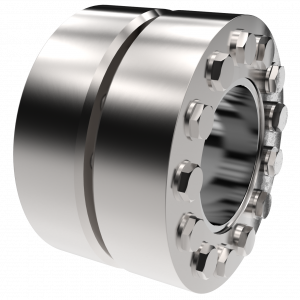TAS Schäfer Stainless Steel Couplings
Short shaft distance, top-tier corrosion resistance. Specially made for sensitive environments that require reliable operation in the toughest environments.

Benefits
- Compact design
- Rigid and backlash-free connection of shaft ends
- Transmittable torque from 75Nm to 51,560Nm
- Shaft diameter from 15mm to 150mm
- Stainless steel material allows for strong corrosion resistance and reliable torque transmission in tough environments
Consisting of a connecting sleeve and two thrust rings. The functional principle is similar to TAS Schäfer’s other shaft couplings, with one exception: It is made with stainless steel. The individual pressure rings or shrink discs generate radial pressure on the functional surfaces of the connecting sleeve, creating a frictional connection between the connecting sleeve and the shaft.
The frictional connection of the two shaft ends allows torques, bending moments as well as axial forces to be transmitted reliably. Compared to other shaft couplings, they are significantly smaller.
Unlike most flexible shaft couplings, the drive or gear side of a rigid shaft coupling must be elastically supported. Due to its type of connection, the rigid shaft coupling is not able to compensate for shaft misalignment. This means that the shafts must be precisely aligned with each other before assembly. Any shocks, deformations or vibrations that occur are compensated for by the elastically mounted part of the drive train.
Stainless steel shaft couplings can be used, for example, in the marine industry, materials handling, mixing and process engineering, as well as in the entire drive technology where a safe and backlash-free connection of two shaft ends is required. But most importantly, wherever the increased risk of corrosion and purity are a priority.
Benefits of 1.4122 Stainless Steel
Shaft-hub connections made of stainless steel are increasingly used in industry today. On the one hand, this is due to the fact that the demands on the components in certain industries are becoming ever higher, but at the same time, the processing of stainless steel has also become easier. Stainless products in drive technology are particularly characterised by their resistance to chemically aggressive substances. They are therefore increasingly used in the food and packaging industries, maritime technology, laundry technology or in laboratory equipment. In general, stainless products are used wherever the increased risk of corrosion and purity are important criteria.
The Standard stainless steel 1.4122 used is martensitic with good corrosion resistance and excellent wear resistance. If the product is to be used in a more aggressive environment, the 1.4571 material is preferred. This stainless austenitic steel offers very good corrosion resistance and is also suitable for cryogenic and elevated temperatures up to 550°C.
However, it should be noted that despite good mechanical properties, products made of stainless steel achieve lower transmission values than comparable products made of standard materials such as 42CrMo4+QT. In addition to the mechanical properties of the steel, the mechanical properties of the clamping screws are decisive for this. The strength values of stainless steel tension bolts are significantly lower than the strength values of high-strength steel bolts. As a rule, however, the transmission values of stainless products are sufficient for their use. Should this not be the case, special solutions can be implemented quickly and easily.
| Type (mm) | dw (mm) | Mmax (Nm) | Fax (kN) | D (mm) | L (mm) | H (mm) | A (mm) | M A mm | Z Pcs. | S | DIN | Class | pw (N/mm²) | Weight (Kg) |
| W015 | 15 | 75 | 10 | 55 | 30 | 33 | 37 | 5,8 | 7 | M5 x 25 | 933 | A4-K80 | 95 | 0,5 |
| W015 | 17 | 137 | 16 | 55 | 30 | 33 | 37 | 5,8 | 7 | M5 x 25 | 933 | A4-K80 | 135 | 0,5 |
| W020 | 18 | 105 | 12 | 60 | 34 | 37 | 42 | 7,5 | 8 | M6 x 30 | 931 | A4-K80 | 81 | 0,7 |
| W020 | 20 | 155 | 16 | 60 | 34 | 37 | 42 | 7,4 | 8 | M6 x 30 | 931 | A4-K80 | 97 | 0,7 |
| W020 | 22 | 241 | 22 | 60 | 34 | 37 | 42 | 7,4 | 8 | M6 x 30 | 931 | A4-K80 | 125 | 0,7 |
| W025 | 23 | 250 | 22 | 66 | 38 | 41 | 48 | 9,3 | 8 | M6 x 30 | 931 | A4-K80 | 106 | 0,8 |
| W025 | 25 | 355 | 28 | 66 | 38 | 41 | 48 | 9,4 | 8 | M6 x 30 | 931 | A4-K80 | 127 | 0,8 |
| W025 | 27 | 475 | 23 | 66 | 38 | 41 | 48 | 9,4 | 8 | M6 x 30 | 931 | A4-K80 | 146 | 0,8 |
| W030 | 28 | 435 | 31 | 76 | 42 | 45 | 54 | 8,2 | 10 | M6 x 35 | 931 | A4-K80 | 113 | 1,3 |
| W030 | 30 | 562 | 37 | 76 | 42 | 45 | 54 | 8,2 | 10 | M6 x 35 | 931 | A4-K80 | 127 | 1,3 |
| W030 | 32 | 667 | 42 | 76 | 42 | 45 | 54 | 8,2 | 10 | M6 x 35 | 931 | A4-K80 | 132 | 1,3 |
| W035 | 33 | 510 | 31 | 80 | 46 | 49 | 62 | 8,2 | 12 | M6 x 35 | 931 | A4-K80 | 87 | 1,5 |
| W035 | 35 | 660 | 38 | 80 | 46 | 49 | 62 | 8,2 | 12 | M6 x 35 | 931 | A4-K80 | 100 | 1,5 |
| W035 | 37 | 820 | 44 | 80 | 46 | 49 | 62 | 8,2 | 12 | M6 x 35 | 931 | A4-K80 | 111 | 1,5 |
| W040 | 38 | 810 | 43 | 98 | 50 | 54 | 71 | 20 | 8 | M8 x 40 | 931 | A4-K80 | 96 | 2,5 |
| W040 | 40 | 985 | 49 | 98 | 50 | 54 | 71 | 20 | 8 | M8 x 40 | 931 | A4-K80 | 105 | 2,5 |
| W040 | 43 | 1280 | 60 | 98 | 50 | 54 | 71 | 20 | 8 | M8 x 40 | 931 | A4-K80 | 118 | 2,5 |
| W050 | 44 | 1440 | 65 | 115 | 60 | 64 | 86 | 39,5 | 8 | M10 x 45 | 931 | A4-K80 | 106 | 4 |
| W050 | 50 | 2190 | 88 | 115 | 60 | 64 | 86 | 39,5 | 8 | M10 x 45 | 931 | A4-K80 | 124 | 4 |
| W050 | 54 | 2700 | 100 | 115 | 60 | 64 | 86 | 39,5 | 8 | M10 x 45 | 931 | A4-K80 | 131 | 4 |
| W060 | 55 | 2560 | 93 | 125 | 70 | 74 | 98 | 39,5 | 10 | M10 x 50 | 931 | A4-K80 | 103 | 5,3 |
| W060 | 60 | 3420 | 114 | 125 | 70 | 74 | 98 | 39,5 | 10 | M10 x 50 | 931 | A4-K80 | 116 | 5,3 |
| W060 | 64 | 4200 | 131 | 125 | 70 | 74 | 98 | 39,5 | 10 | M10 x 50 | 931 | A4-K80 | 125 | 5,3 |
| W070 | 65 | 4110 | 126 | 148 | 80 | 85 | 112 | 39,5 | 12 | M10 x 60 | 931 | A4-K80 | 104 | 8,4 |
| W070 | 70 | 5200 | 149 | 148 | 80 | 85 | 112 | 39,5 | 12 | M10 x 60 | 931 | A4-K80 | 113 | 8,4 |
| W070 | 74 | 6170 | 167 | 148 | 80 | 85 | 112 | 39,5 | 12 | M10 x 60 | 931 | A4-K80 | 120 | 8,4 |
| W080 | 75 | 6950 | 185 | 170 | 94 | 99 | 130 | 68 | 12 | M12 x 70 | 931 | A4-K80 | 112 | 13,1 |
| W080 | 80 | 8400 | 210 | 170 | 94 | 99 | 130 | 68 | 12 | M12 x 70 | 931 | A4-K80 | 119 | 13,1 |
| W080 | 84 | 9280 | 221 | 170 | 94 | 99 | 130 | 68 | 12 | M12 x 70 | 931 | A4-K80 | 119 | 13,1 |
| W090 | 85 | 8550 | 201 | 185 | 104 | 109 | 145 | 166 | 7 | M16 x 80 | 931 | A4-K80 | 99 | 17 |
| W090 | 90 | 10250 | 228 | 185 | 104 | 109 | 145 | 166 | 7 | M16 x 80 | 931 | A4-K80 | 106 | 17 |
| W090 | 94 | 11730 | 250 | 185 | 104 | 109 | 145 | 166 | 7 | M16 x 80 | 931 | A4-K80 | 111 | 17 |
| W100 | 95 | 13400 | 335 | 200 | 114 | 119 | 158 | 166 | 9 | M16 x 90 | 931 | A4-K80 | 113 | 21 |
| W100 | 100 | 15580 | 312 | 200 | 114 | 119 | 158 | 166 | 9 | M16 x 90 | 931 | A4-K80 | 119 | 21 |
| W100 | 104 | 17450 | 336 | 200 | 114 | 119 | 158 | 166 | 9 | M16 x 90 | 931 | A4-K80 | 123 | 21 |
| W110 | 105 | 19700 | 375 | 217 | 124 | 129 | 170 | 156 | 12 | M16 x 90 | 931 | A4-K80 | 125 | 27 |
| W110 | 110 | 22400 | 407 | 217 | 124 | 129 | 170 | 156 | 12 | M16 x 90 | 931 | A4-K80 | 129 | 27 |
| W110 | 114 | 24750 | 434 | 217 | 124 | 129 | 170 | 156 | 12 | M16 x 90 | 931 | A4-K80 | 133 | 27 |
| W120 | 115 | 25800 | 449 | 235 | 134 | 139 | 184 | 166 | 13 | M16 x 90 | 931 | A4-K80 | 126 | 33 |
| W120 | 120 | 28960 | 483 | 235 | 134 | 139 | 184 | 166 | 13 | M16 x 90 | 931 | A4-K80 | 130 | 33 |
| W120 | 124 | 31260 | 504 | 235 | 134 | 139 | 184 | 166 | 13 | M16 x 90 | 931 | A4-K80 | 131 | 33 |

